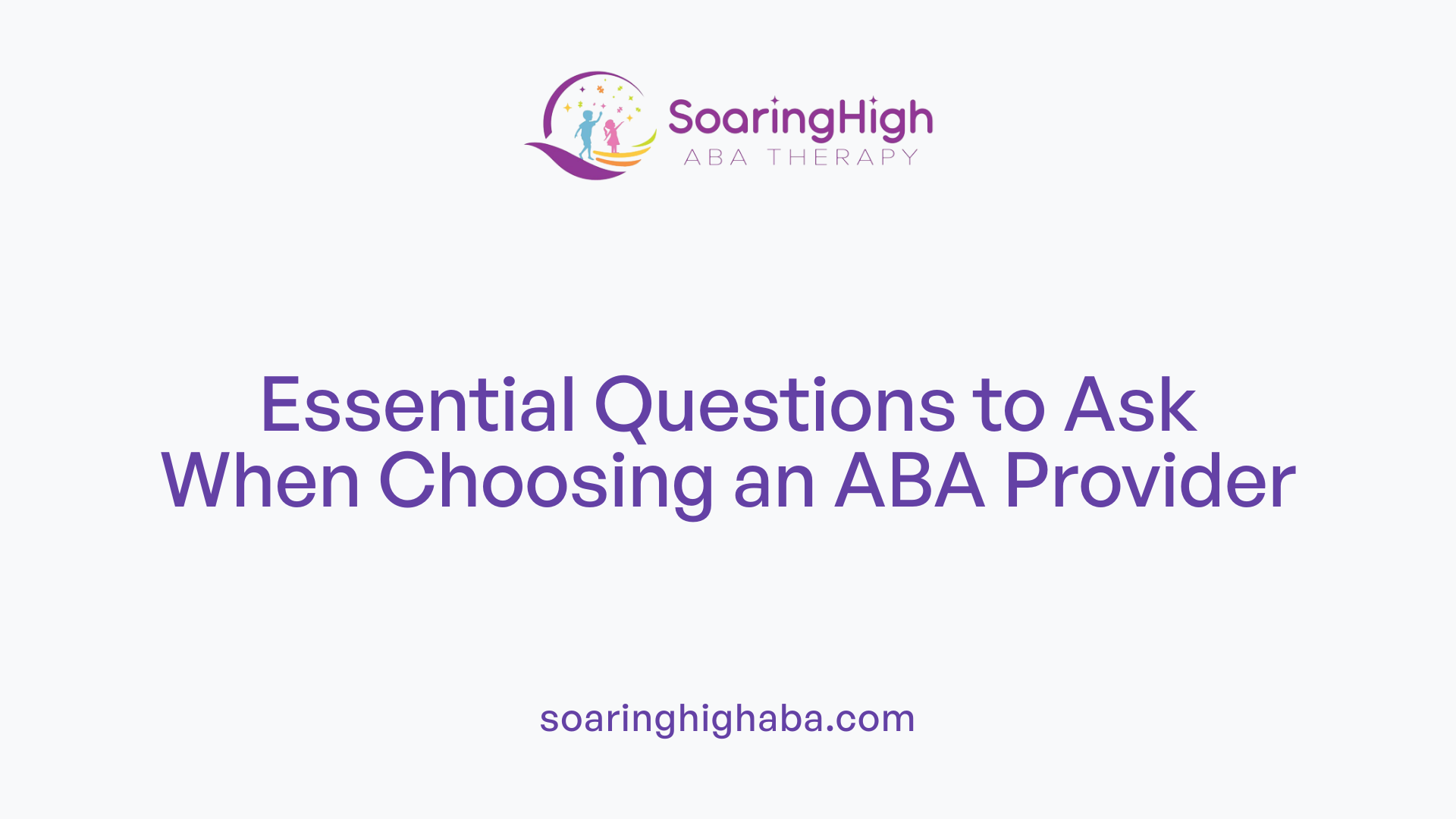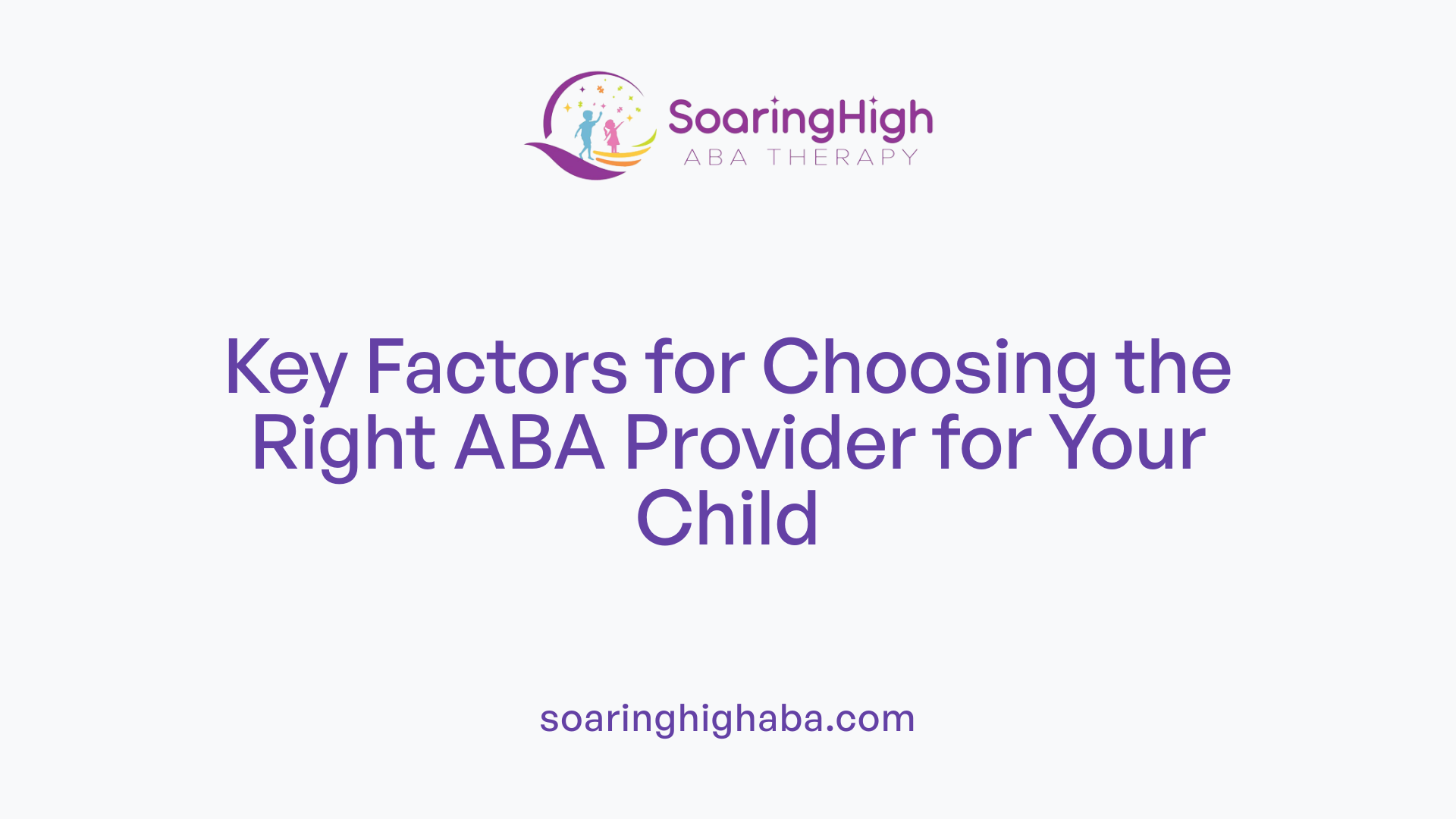Understanding ABA Therapy and Its Importance
Choosing the right ABA (Applied Behavior Analysis) provider for your child is a crucial step towards supporting their development and ensuring they receive effective, ethical, and personalized care. ABA therapy is a structured, evidence-based intervention that focuses on teaching new skills and reducing problematic behaviors through reinforcement techniques rooted in learning theory. It is widely used for children with autism and other developmental disorders, aiming to improve communication, social interaction, and independence.
Evaluating ABA Therapy and Making Informed Decisions

What does ABA therapy involve, and how can I make an informed decision about it?
ABA, or Applied Behavior Analysis, is a structured approach that uses principles of learning theory to help children develop new skills and reduce undesirable behaviors. This evidence-based therapy involves tailored interventions designed to meet each child's unique needs.
During ABA sessions, therapists typically collect data to track progress and adjust treatment plans accordingly. The focus areas often include communication, social skills, independence, and daily living activities. Techniques such as reinforcement, shaping, and chaining are employed within a safe, engaging environment.
To decide if ABA therapy is right for your child, it’s crucial to learn about its methods and goals. Consulting qualified Behavior Analysts, especially Board Certified Behavior Analysts (BCBAs), can provide insight into how the therapy is personalized for individual needs. Ethical considerations, including respecting your child's dignity and avoiding harmful practices, are fundamental in selecting a provider.
Researching resources like "Ethical Decision Making in Applied Behavior Analysis" helps ensure that the therapy is conducted responsibly. Talking to other families, reviewing professional credentials, and observing initial sessions can also help you gauge whether ABA aligns with your family’s values and your child’s goals.
Questions to Ask Potential ABA Providers

What questions should I ask ABA providers during the selection process?
When searching for an ABA provider for your child, asking the right questions is crucial to ensure high-quality care. Start by inquiring about the credentials and experience of the staff. All therapists working with your child should be certified, such as Board Certified Behavior Analysts (BCBAs) or Registered Behavior Technicians (RBTs). Confirm how long they have been practicing and whether they have specific experience working with children with autism.
Next, ask about their treatment approaches. Be sure they use evidence-based techniques backed by research, such as Pivotal Response Treatment (PRT), Verbal Behavior (VB), or Relational Frame Theory (RFT). Find out how they tailor interventions to meet your child's individual needs and abilities.
Involve questions on family participation as well. Good providers involve caregivers in setting goals, providing training, and offering ongoing feedback. Transparency in progress measurement is essential; inquire about their data collection methods, how they track progress, and how often they review and adjust treatment plans.
Also, discuss safety protocols and oversight standards. Confirm that staff undergo background checks and are trained in managing challenging behaviors like aggression or self-injury. Clarify supervision practices—whether qualified BCBAs oversee interventions directly—and how they ensure ethical treatment.
Finally, understand the setting of therapy sessions—whether at home, in clinics, or in community settings—and whether schedules are flexible enough to accommodate your family’s lifestyle. Trusting your instincts and observing how responsive and transparent the provider is can also guide your decision.
Thoroughly asking these questions can help you select a provider committed to respectful, effective, and individualized care for your child.
Assessing the Quality and Suitability of ABA Services

What criteria should I use to assess the quality and suitability of ABA services for my child's needs?
When looking into ABA therapy options, it is essential to consider several important factors to ensure your child receives safe, effective, and compassionate care.
First, verify the credentials of the providers. High-quality programs are run by licensed and certified professionals such as Board Certified Behavior Analysts (BCBAs) and Registered Behavior Technicians (RBTs). Reputable programs should employ BCBAs to oversee treatment plans and supervise therapists, maintaining appropriate staff-to-child ratios to ensure personalized attention.
Second, assess how well the program develops individualized treatment plans. These should be based on comprehensive initial assessments that identify your child's unique strengths, needs, and interests. Effective plans use proven strategies like reinforcement, shaping, and chaining, all tailored to promote meaningful skill development relevant to your child's daily life.
Third, inquire about how the provider collects and analyzes data. Successful ABA services rely on consistent monitoring of progress through measurable outcomes. Data tracking helps guide necessary adjustments to intervention strategies, ensuring your child’s growth is on track.
Fourth, family involvement and transparency are vital. The best programs actively engage caregivers by providing training and regular updates, fostering collaboration in setting goals, and evaluating progress. Transparent communication about costs, scheduling, safety policies, and methods used reassures families and promotes trust.
Finally, check for external accreditation. Programs accredited by reputable organizations like the Behavioral Health Center of Excellence (BHCOE) adhere to strict standards of safety, quality, and ethics.
Choosing an ABA provider is a significant decision that influences your child's development and well-being. Prioritizing these criteria will help you find a service that meets your family’s needs and ensures your child receives respectful, effective, and tailored intervention.
Factors to Consider When Selecting an ABA Provider

What factors should I consider when selecting an ABA provider, such as clinical oversight, individualized treatment plans, and family involvement?
When choosing an ABA provider, it's crucial to verify that the staff includes qualified professionals, especially Board Certified Behavior Analysts (BCBAs) who oversee the treatment plan. These experts are responsible for designing tailored interventions that align with your child's specific needs.
Effective ABA programs should be individualized, focusing on your child's unique developmental profile and learning style. The best providers incorporate your family's goals and priorities into the treatment plan, ensuring that therapy is meaningful and applicable in daily life.
Family involvement plays a vital role in the success of ABA. Look for providers that actively involve caregivers through goal setting, training, and regular feedback. Transparent communication helps families understand behavioral techniques and supports consistent implementation at home.
Scheduling flexibility and setting-specific services enhance the effectiveness of therapy. Whether sessions take place at home, in clinics, or at school, arrangements should fit smoothly into your routine and cater to your child’s comfort.
Lastly, ethical practices such as safety measures, proper staff training, data collection, and treatment transition plans are essential. These ensure not only immediate progress but also long-term success and generalization of skills.
| Consideration | What to Look For | Why It’s Important | Example |
|---|---|---|---|
| Clinical Oversight | BCBAs supervising treatment | Ensures professional, evidence-based approaches | Regularly scheduled supervision sessions by licensed BCBAs |
| Individualized Treatment | Custom plans based on comprehensive assessments | Addresses child's specific needs and goals | Tailored goals like social skills, communication, daily living skills |
| Family Involvement | Parent training, feedback sessions | Reinforces learning and fosters consistency | Workshops and ongoing support for caregivers |
| Setting and Scheduling | Flexibility in location and times | Improves accessibility and comfort | Available sessions at home, clinic, evenings, or weekends |
| Ethical and Safety Measures | Staff background checks, safety protocols | Protects child's well-being | Staff trained in managing aggression and behavioral challenges |
Choosing the right ABA provider involves careful assessment of qualifications, personalized planning, and active family participation to support meaningful, lasting improvements.
Steps to Choose the Ideal ABA Provider for Your Child
Research and shortlisting
Begin your search by exploring local ABA providers known for high-quality care. Prioritize those with staff members who are properly credentialed, such as Board Certified Behavior Analysts (BCBAs), and confirm that they follow strict safety measures, including background checks for staff. Review their experience with children who have similar needs and check for positive reviews or references from other families.
Create a shortlist based on the provider’s philosophy, treatment methods, and reputation. Look for organizations that emphasize evidence-based practices and family involvement. This initial filtering will help focus your efforts on the most suitable options.
Verifying credentials and safety measures
It is crucial to verify the professional credentials of the therapists, especially BCBAs overseeing treatment plans. Confirm their educational background, such as a master's degree or Ph.D. in psychology or behavior analysis, and ensure they meet certification standards from the Behavior Analyst Certification Board (BACB).
Ask about safety protocols, including how staff handle challenging behaviors and their procedures for preventing and managing aggression or self-injurious actions. Staff training in behavior management and crisis intervention is also essential. Ensuring these safety standards protects your child's well-being.
Initial consultation and observation
Schedule an initial consultation to meet potential providers and observe therapy sessions if possible. Pay attention to how staff interact with your child—are they respectful, engaging, and attentive?
A good provider should involve family members in discussions, explain their treatment approach clearly, and listen to your concerns. Watching a session can give insights into the environment’s safety, the therapists’ competence, and how relaxed and happy your child appears.
Evaluating treatment approach and family fit
Ask about the specific techniques used, focusing on positive reinforcement and personalized plans tailored to your child's needs. Check if the provider regularly collects data to monitor progress and if they involve families through training and feedback.
Compatibility with your family’s values and routines is critical. The provider should accommodate your scheduling preferences and support your goals for your child's development.
Logistical considerations and long-term planning
Consider practical aspects such as location, wait times, and the availability of trained staff, like Registered Behavior Technicians (RBTs), to start therapy promptly. Clarify costs, billing practices, and what services are covered by insurance, ensuring transparency.
Discuss the provider’s plans for transitioning your child out of intensive therapy as they develop, including how they support skill generalization and independence. Ultimately, selecting a provider involves balancing professional qualifications with your child’s comfort and your family’s needs.
Making the Right Choice for Your Child’s Future
Selecting the appropriate ABA provider involves careful research, thorough questioning, and assessing how well their practices align with your child's needs and your family’s values. Focus on qualification, experience, ethical standards, and family involvement to ensure the best fit. A high-quality provider will prioritize personalized, data-driven, and ethically sound interventions that promote meaningful, sustainable progress. Remember, your active participation and open communication are key drivers of successful therapy outcomes. With diligent evaluation and thoughtful decision-making, you can find a provider who not only enhances your child's development but also supports your family's journey towards a brighter future.
References
- Questions to ask an ABA therapist
- How to Choose a Provider for Applied Behavior Analysis ...
- How to Choose the Right ABA Therapy Provider for Your Family
- Tips for Choosing the Right Therapy Provider for Your Child
- What to Look for When Choosing an ABA Therapy Program
- 5-Point Checklist for Choosing the Right ABA Therapy ...
- What to Consider When Looking for a Qualified ABA Provider
- 7 Things to Look for in a Quality ABA Provider





































































































